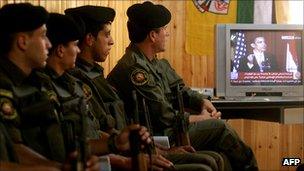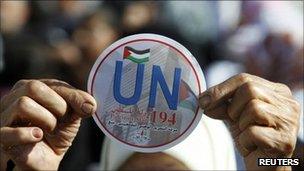Viewpoint: The end of a new beginning?
- Published

A Palestinian flag is waved beside an Israeli army watchtower between Ramallah and Jerusalem
Unless the US has more than a veto to offer in response to the Palestinian UN membership bid, then President Obama's 2009 Cairo speech to the Islamic world will have been just words, says former US Assistant Secretary of State PJ Crowley.
When US President Barack Obama stepped to the podium in New York last Wednesday, he welcomed a new governing body to the United Nations.
The fact that it was the National Transitional Council from Libya was in its own right remarkable.
The fact that it was not the Palestinian Authority was regrettable.
That he was forced to threaten to veto the Palestinian application for membership was a policy failure.
US credibility damaged
To be clear, the United States policy, which President Obama re-emphasised in his speech - direct negotiations as the only viable path to a two-state solution - is correct.
The failure was arriving in New York in the midst of a period of historic and transformational change to deal with a Palestinian request for statehood, and having nothing more to offer than a veto threat.
The president - who spoke in Cairo in June 2009 of bold action and a new beginning; who said: "human progress cannot be denied" - needed a better response.
Without one going forward, to the Islamic world, Cairo's speech will have been a dead end.
A veto is not a certainty.
The UN will study the Palestinian request, giving the United States and the Quartet (the US, UN, EU and Russia) time to construct a plausible path back to direct negotiations.
Making history
But the threat was made, which means some damage to US credibility has already been done.

Palestinian security forces listening to President Obama's 2009 Cairo speech
On Friday night the Quartet issued a statement calling for the Israelis and Palestinians to begin consultations within 30 days, develop specific proposals within three months and achieve an agreement by the end of 2012.
This should have been done weeks ago, another example of United States policy, or at least its practice, lagging far behind events in this vital part of the world.
President Obama acknowledged in his UN address that Palestinian aspirations for statehood were a "test of American foreign policy".
But what he put forward - encouragement without a realistic plan for achievement - was not good enough.
The protesters who are living and making history every day have raised the bar.
They are, as the president said, "claiming their universal right to live in freedom and dignity".
Crippling lack of trust
Who told them to demand more of their governments? It was the president of the United States, in Cairo.

Direct talks between Israel and the Palestinians stalled in September 2010
A year ago at the UN, with direct negotiations underway but already faltering, the president raised expectations that an agreement could be reached within 12 months that would enable the international community to welcome Palestine into the community of nations.
That plan fell apart a short time later.
The administration had made a settlement freeze its own pre-condition for negotiations, and then failed to enforce its own policy.
President Obama's public criticism of Israel's settlement policy created a political backlash at home, which put the president on the defensive.
But even the two meetings between Mahmoud Abbas and Benjamin Netanyahu revealed a crippling lack of trust between them, limiting what the leaders were likely to achieve.
Then came the Arab Spring, which has fundamentally altered the landscape, but heightened expectations and the role of public opinion in shaping policies and driving actions.
Where others saw complexity and even danger, Mr Abbas sensed both need and opportunity.
Palestinian Spring?
Seeing the demise of his staunchest ally in the region, former Egyptian President Hosni Mubarak, who failed to move fast enough to respond to the aspirations of his people, Mr Abbas changed his playbook and took the offensive.
Even knowing that their lives could become more difficult, 83% of Palestinians support the petition for statehood. Mr Abbas has both newfound political leverage and a stronger narrative.

The UN Security Council is now considering the Palestinian bid for full state membership
If an Arab Spring, why not a Palestinian Spring?
None of this was a surprise. Mr Abbas told everyone what he planned to do, and somehow still caught the United States flat-footed.
Whether American officials misread Mr Abbas or under-estimated the implications of a veto threat on its global standing, neither is reassuring.
Coming into office, the Obama administration recognised the importance of public opinion in the Islamic world and the need to reset perceptions of the United States and its policies - and build a counter-narrative.
This was why the President went to Cairo.
In Cairo, the president spoke of facing tensions squarely, building an international consensus, living up to responsibility and embracing change.
A veto is a retreat from that hopeful vision.
This is a test. Peace is hard. But if the only answer is a veto, then Cairo no longer represents US policy.
It was only a speech.
- Published23 September 2011
- Published21 September 2011